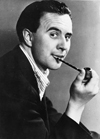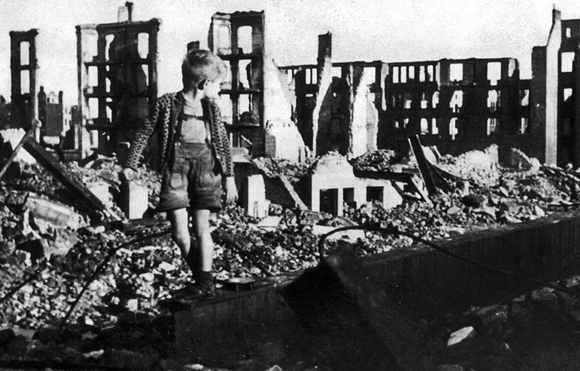

Hinweis für Smartphone-Nutzer: Diese Website läßt sich am besten auf einem großen Bildschirm betrachten und lesen.
Smartphone users please note: This website is best seen on a big screen.

 he blown-out window in the lonely wall yawned blue-red full of early evening sun. Dust clouds flickered between the steeply stretched chimney remains. The wasteland of rubble dozed.
he blown-out window in the lonely wall yawned blue-red full of early evening sun. Dust clouds flickered between the steeply stretched chimney remains. The wasteland of rubble dozed.
His eyes were closed. All at once it grew even darker. He realized that someone had come and was now standing in front of him, dark, silent. Now they have me! he thought. But when he blinked a little, he saw only two legs in slightly tattered pants. They were standing rather crookedly in front of him, that he was able to look straight through them. He risked a little blink up the trouser legs and recognized an older man. He had a knife and a basket in his hand. And some soil on his fingertips.
"You're sleeping here, aren't you?" the man asked, looking down at the mop of hair. Jürgen blinked between the man's legs into the sun and said, "No, I'm not sleeping. I have to watch out here." The man nodded: "So, So that's why you've got that big stick there?"
"Yes," Jürgen answered courageously and held the stick.
"What are you guarding?"
"I can't say." He held his hands tightly around the stick.
"Probably money, eh?" The man set the basket down and wiped the knife back and forth on the seat of his pants.
"No, not money at all," Jürgen said contemptuously. "Something else entirely."
"Well, what is it?"
"I can't say. Something else."
"Well, don't. Then of course I won't tell you what I have here in the basket." The man bumped the basket with his foot and folded the knife.
"Pah, I can guess what's in the basket," Jürgen said disdainfully, "rabbit food."
"Gosh, yes!" said the man in amazement, "you're a fast guy. How old are you?"
"Nine."
"Oha, think of it, nine. Then you know how much three times nine is, don't you?"
"Sure," Jürgen said, and to gain time he added: "That's easy." And he looked through the man's legs. "Three times nine, right?" he asked again, "twenty-seven. I knew that right away."
"That's right," said the man, "that's exactly how many rabbits I have."
Jürgen rounded his mouth: "Twenty-seven?"
"You can see them. Many are still very young. Do you want to?"
"But I can't. I have to be on guard" Jürgen said uncertainly.
"All the time?" the man asked, "at night too?"
"At night, too. All the time. Always." Jürgen looked up at his bent legs. "Since Saturday," he whispered.
"But aren't you going home at all? You have to eat," Jürgen lifted a stone. There lay half a loaf of bread. And a tin box.
"You smoke?" the man asked, "do you have a pipe?"
Jürgen grasped his stick firmly and said timidly: "I roll. I don't like a pipe."
"Too bad," the man bent down to his basket, "you could have looked at the rabbits. Especially the young ones. Maybe you would have chosen one. But you can't leave here."
"No," said Jürgen sadly, "no, no."
The man took the basket and straightened up. "Well, if you have to stay here — too bad." And he turned around. "If you don't tell anyone," Jürgen said quickly, "it's because of the rats." The crooked legs took a step back: "Because of the rats?"
"Yes, they feed on dead people, you know. Humans. That's how they survive."
"Who says that?"
"Our teacher."
"So you're on guard for the rats?" the man asked.
"Not them!" And then he said quietly: "My brother is lying down there. There." Jürgen pointed with his stick to the collapsed walls. "Our house was hit by a bomb. All of a sudden the lights went off in the basement. And he was gone too. We called and called for him. He was much smaller than me. Only four. He must still be here. He is much smaller than me."
The man looked from above at the mop of hair. But then he suddenly said, "Yes, didn't your teacher tell you that rats sleep at night?"
"No," whispered Jürgen, looking very tired all of a sudden, "he didn't tell us."
"Well," said the man, "that's some lousy teacher if he doesn't even know that. At night the rats do sleep. You can go home at night. They always sleep at night. Even when it's just getting dark, they're already asleep."
Jürgen dug little holes in the rubble with his stick.
They are all small beds, he thought, all small beds. Then the man said (and his weak legs shifted uneasily as he said it): "You know what? Now I'll quickly feed my rabbits and when it gets dark, I'll pick you up. Maybe I can bring one with me. A small one or, what do you think?"
Jürgen kept digging little holes in the gravel. All little rabbits. White ones, gray ones, white-gray ones. "I don't know," he said quietly, looking at the crooked legs, "if they really sleep at night."
The man climbed over the remains of the wall away to the street. "Of course," he said from there, "your teacher should pack up if he doesn't even know."
Then Jürgen stood up and asked: "If I can get one? A white one perhaps?"
"I'll try it," the man called as he left, "but you'll have to wait here. I'll go home with you, you know. I have to tell your father how a rabbit hutch is built. Because you have to know that."
"Yes," Jürgen shouted, "I'll wait. I still have to watch out until it gets dark. I'll wait for sure." And he called out: "We also have boards at home. Box boards," he shouted.
But the man didn't hear that anymore. He walked with his crooked legs towards the sun. It was already evening-red and Jürgen could see it shining through his legs, they were so crooked. And the basket was swinging back and forth excitedly. Rabbit food was in there. Green rabbit food, a little gray from the debris.




Please read the terms of use, legal information and other conditions. The automated analysis of the work in order to obtain information, in particular about patterns, trends and correlations ("text and data mining") is prohibited.